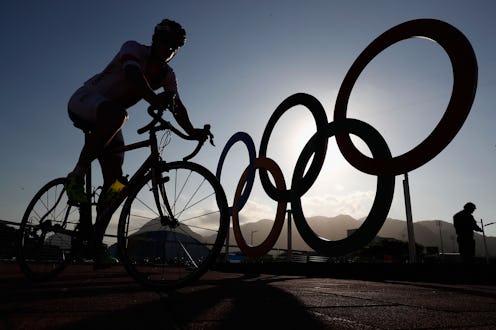News
This Is What Olympians Can Expect To Earn
Olympic athletes may be vying to bring home the gold this summer, but that doesn't mean it'll translate to cold hard cash. While the world is again training its eyes on these top athletes, excited to see them duke it out for medals, it turns out they may be competing for corporate sponsorship just as much as anything else. That's because Olympians get paid a grand total of zero dollars for their training and time at the event.
That's right: The International Olympic Committee does not pay its athletes for participating in the Olympics. Given that making it to the Olympics is often a culmination of their life's work, the lack of monetary compensation does seem strange, to say the least. They are, however, compensated in other indirect ways. American athletes, for instance, earn what's called a "medal bonus" — the U.S. Olympic Committee pays out $25,000 for gold, $15,000 for silver, and $10,000 for bronze.
Business Insider noted during the 2012 Olympics, however, that the amounts hadn't gone up in the previous 10 years, and were worth $5,000 less due to heightened inflation. Athletes from other countries also earn a medal bonus, but in some instances, there's a catch: gold medalists from Malaysia will receive a gold bar worth $600,000, but no Malaysian athlete has taken home a gold medal since the country began participating in1956.
There are other ways to make a direct income, though. Become an Olympic darling like swimmer Michael Phelps and you could see corporate sponsorship, like deals from Subway and AT&T, line up at your door. But according to The Washington Post, most corporate sponsorship trickles down through the IOC, leaving little for the athletes by the time the games are over. The most tangible prize many athletes will be taking home is the athletic wear they are required to don at all Olympic events.
Athletes are beginning to speak out against this, too. Some blame the Olympic Movement, the leading arm of the Olympics and all of the organizations and athletes beneath it. In this vein, The Washington Post likewise highlights a review conducted of the Olympic Movement (consisting of organizations such as the IOC and the U.S. Olympic Committee) and found that many of the multibillion-dollar industry's athletes are living in poverty. The review showed that the United States' top track and field athletes earned an average of $16,553 per year.
Evidently, these number are common. Cyrus Hostetler, a two-time Olympic javelin thrower, said of the Olympic Movement: "The athletes are the very bottom of a trickle-down system, and there’s just not much left for us," he told The Washington Post. "They take care of themselves first, and us last." Hostetler estimated that after expenses, the most he's ever made in one year from his sport was $3,000. That is a stark difference from the billions paid out to the Movement's top executives and staffers.
The system that protects the Olympic Movement is complex — as a nonprofit entity based out of Switzerland, the Movement is not required to disclose how they spend their money. Changing that system is even more complex, as many athletes, in lieu of compensation, acknowledge that they must train solely for the love of the sport.
This information does put a strange spin onto the approaching Summer Olympics — as athletes run in their Nike shoes and parade around in Ralph Lauren clothing, both viewers and athletes will have to reconcile the fact that for many Olympians, they won't be receiving much else.
